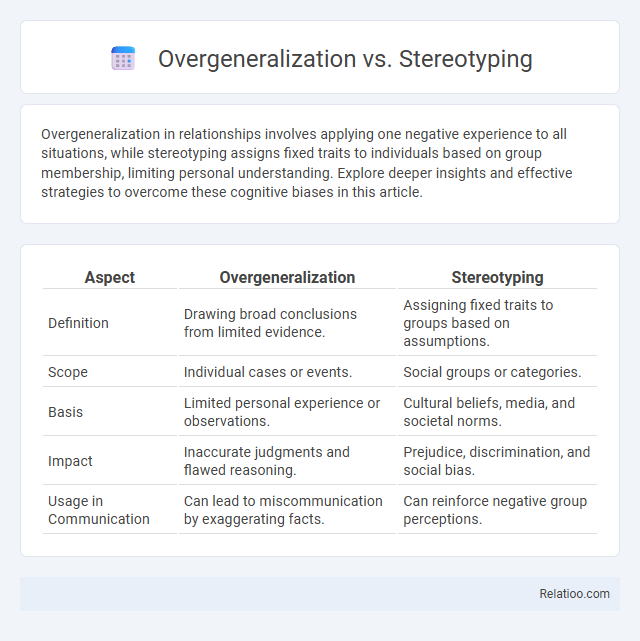Overgeneralization in relationships involves applying one negative experience to all situations, while stereotyping assigns fixed traits to individuals based on group membership, limiting personal understanding. Explore deeper insights and effective strategies to overcome these cognitive biases in this article.
Table of Comparison
| Aspect | Overgeneralization | Stereotyping |
|---|---|---|
| Definition | Drawing broad conclusions from limited evidence. | Assigning fixed traits to groups based on assumptions. |
| Scope | Individual cases or events. | Social groups or categories. |
| Basis | Limited personal experience or observations. | Cultural beliefs, media, and societal norms. |
| Impact | Inaccurate judgments and flawed reasoning. | Prejudice, discrimination, and social bias. |
| Usage in Communication | Can lead to miscommunication by exaggerating facts. | Can reinforce negative group perceptions. |
Understanding Overgeneralization: Definition and Examples
Overgeneralization involves making broad conclusions based on limited evidence, such as assuming all dogs are dangerous because one dog barked aggressively. Unlike stereotyping, which attributes fixed characteristics to an entire group, overgeneralization stems from personal experiences leading to inaccurate and exaggerated beliefs. Understanding your tendency to overgeneralize helps challenge these flawed assumptions and promotes more balanced thinking.
Stereotyping Explained: Meaning and Common Occurrences
Stereotyping involves assigning fixed, oversimplified beliefs to a group, often based on limited information or assumptions, which can lead to unfair judgments and social biases. You encounter stereotyping frequently in media portrayals, workplace dynamics, and social interactions, where individuals are categorized by race, gender, age, or occupation without recognizing their unique qualities. Understanding the distinction between stereotyping, overgeneralization, and generalization is crucial to challenge and reduce these cognitive biases for more accurate and respectful perceptions.
Key Differences Between Overgeneralization and Stereotyping
Overgeneralization involves making broad conclusions based on limited evidence, while stereotyping assigns fixed attributes to an entire group without considering individual variation. Key differences include that overgeneralization stems from insufficient data leading to erroneous assumptions, whereas stereotyping actively categorizes people based on social or cultural groupings. Understanding these distinctions is crucial for reducing bias and improving critical thinking in social contexts.
The Psychology Behind Overgeneralization
Overgeneralization in psychology refers to the cognitive distortion where individuals draw broad conclusions based on limited evidence, often leading to negative self-perceptions or worldviews. Unlike stereotyping, which categorizes groups based on generalized traits, overgeneralization primarily affects personal beliefs and emotional patterns. Understanding the psychology behind overgeneralization can help you recognize and challenge these automatic thought patterns, promoting healthier cognitive processing and mental well-being.
How Stereotypes Develop and Persist
Stereotypes develop through repeated exposure to simplified and often inaccurate representations of groups in media, social interactions, and cultural narratives, reinforcing cognitive shortcuts in human thinking. These generalized beliefs persist because they provide an easy framework for your brain to categorize information, despite often lacking nuance or individual variability. Understanding this process is crucial to challenging stereotypes and reducing their impact on personal biases and social behavior.
Cognitive Biases Fueling Overgeneralization and Stereotyping
Cognitive biases such as confirmation bias and availability heuristic fuel Overgeneralization and Stereotyping by leading Your mind to selectively focus on information that supports pre-existing beliefs while ignoring contradictory evidence. These biases distort perception, causing broad generalizations and oversimplified conclusions about groups or situations, which hinders critical thinking and perpetuates inaccurate assumptions. Recognizing these cognitive biases is essential to countering the tendency toward Overgeneralization and Stereotyping in everyday reasoning.
Effects of Overgeneralization in Everyday Interactions
Overgeneralization in everyday interactions often leads to misunderstandings by attributing specific traits or behaviors to an entire group, causing unfair judgments and communication barriers. Unlike stereotyping, which relies on fixed, oversimplified beliefs about groups, overgeneralization applies broad conclusions drawn from limited experiences, intensifying social biases and hampering empathy. This cognitive distortion can result in persistent prejudices and negatively impact relationships by fostering mistrust and reducing openness to individual differences.
Consequences of Stereotyping in Society
Stereotyping in society leads to the reinforcement of prejudiced beliefs, limiting individuals' opportunities by promoting unfair assumptions based on group characteristics. Your interactions may perpetuate bias, contributing to social divisions and reducing empathy among diverse communities. These consequences hinder social cohesion and obstruct efforts towards equality and inclusion.
Strategies to Recognize and Avoid Overgeneralization
Recognizing overgeneralization involves identifying statements that apply a broad conclusion based on limited evidence, often marked by words like "always" or "never." Strategies to avoid overgeneralization include critically evaluating the evidence before drawing conclusions, seeking specific examples that support or contradict a claim, and practicing mindfulness to notice cognitive biases. Developing awareness of nuanced perspectives and questioning assumptions helps prevent erroneous sweeping judgments and promotes more accurate, balanced thinking.
Combating Stereotyping: Practical Steps for Change
Combating stereotyping requires recognizing its impact on your perceptions and actively challenging biased beliefs through education and empathy-building. Engaging with diverse perspectives helps dismantle rigid thinking patterns linked to overgeneralization and promotes more accurate, individualized understanding. Practical steps include questioning assumptions, seeking personal interactions beyond stereotypes, and fostering inclusive environments that celebrate differences.

Infographic: Overgeneralization vs Stereotyping
 relatioo.com
relatioo.com